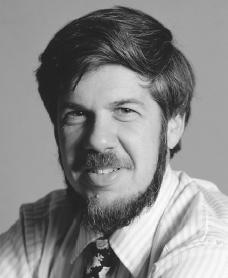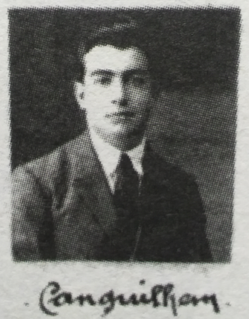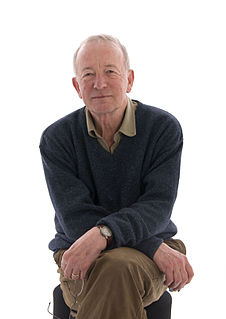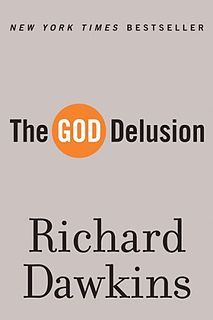
Richard Dawkins is a British evolutionary biologist and author. He is an emeritus fellow of New College, Oxford and was Professor for Public Understanding of Science in the University of Oxford from 1995 to 2008. An atheist, he is well known for his criticism of creationism and intelligent design.

Stephen Jay Gould was an American paleontologist, evolutionary biologist, and historian of science. He was one of the most influential and widely read authors of popular science of his generation. Gould spent most of his career teaching at Harvard University and working at the American Museum of Natural History in New York. In 1996, Gould was hired as the Vincent Astor Visiting Research Professor of Biology at New York University, after which he divided his time teaching between there and Harvard.

The Selfish Gene is a 1976 book on evolution by the ethologist Richard Dawkins, in which the author builds upon the principal theory of George C. Williams's Adaptation and Natural Selection (1966). Dawkins uses the term "selfish gene" as a way of expressing the gene-centred view of evolution, popularising ideas developed during the 1960s by W. D. Hamilton and others. From the gene-centred view, it follows that the more two individuals are genetically related, the more sense it makes for them to behave cooperatively with each other.

A Devil's Chaplain: Reflections on Hope, Lies, Science, and Love is a 2003 book of selected essays and other writings by Richard Dawkins. Published five years after Dawkins's previous book Unweaving the Rainbow, it contains essays covering subjects including pseudoscience, genetic determinism, memetics, terrorism, religion and creationism. A section of the book is devoted to Dawkins' late adversary Stephen Jay Gould.

The Mind's I: Fantasies and Reflections on Self and Soul is a 1981 collection of essays and other texts about the nature of the mind and the self, edited with commentary by philosophers Douglas R. Hofstadter and Daniel C. Dennett. The texts range from early philosophical and fictional musings on a subject that could seemingly only be examined in the realm of thought, to works from the twentieth century where the nature of the self became a viable topic for scientific study.
Llewelyn Powys was a British essayist, novelist and younger brother of John Cowper Powys and T. F. Powys.

Henry More was an English philosopher of the Cambridge Platonist school.

Georges Canguilhem was a French philosopher and physician who specialized in epistemology and the philosophy of science.

Nicholas Keynes Humphrey is an English neuropsychologist based in Cambridge, known for his work on evolution of primate intelligence and consciousness. He studied mountain gorillas with Dian Fossey in Rwanda; he was the first to demonstrate the existence of "blindsight" after brain damage in monkeys; he proposed the theory of the "social function of intellect". He is the only scientist to have edited the literary journal Granta.

An Essay Concerning Human Understanding is a work by John Locke concerning the foundation of human knowledge and understanding. It first appeared in 1689 with the printed title An Essay Concerning Humane Understanding. He describes the mind at birth as a blank slate filled later through experience. The essay was one of the principal sources of empiricism in modern philosophy, and influenced many enlightenment philosophers, such as David Hume and George Berkeley.

The World's Last Night and Other Essays is a collection of essays by C. S. Lewis published in the United States in 1960. The title essay is about the Second Coming of Jesus Christ. The volume also contains a follow-up to Lewis' 1942 novel The Screwtape Letters in the form of "Screwtape Proposes a Toast." The second, fourth and fifth pieces were published in the U.K. in a volume called Screwtape Proposes a Toast and other pieces (1965); the first, sixth and seventh were published in the U.K. in Fern-seed and Elephants and other essays on Christianity (1975). All the pieces were later collected in the comprehensive Essay Collection and Other Short Pieces (2000).
Nicolas Hardy Walter was a British anarchist and atheist writer, speaker and activist. He was a member of the Committee of 100 and Spies for Peace, and wrote on topics of anarchism and humanism.

The Root of All Evil?, later retitled The God Delusion, is a television documentary written and presented by Richard Dawkins in which he argues that humanity would be better off without religion or belief in God.

Red Strangers is a 1939 novel by Elspeth Huxley. The story is an account of the arrival of European settlers to colonial Kenya told through the eyes of four generations of Kikuyu tribesmen in Kenya.

The Oxford Book of Modern Science Writing is an anthology of scientific writings, arranged and introduced by Richard Dawkins of the University of Oxford. Published first in March 2008, it contains 83 writings on many topics from a diverse variety of authors, which range in length from one to eight pages. All inclusions are dated post-1900, and include poetry, anecdotes, and general philosophical musings.
The term New Atheism was coined by the journalist Gary Wolf in 2006 to describe the positions promoted by some atheists of the twenty-first century. New Atheism advocates the view that superstition, religion and irrationalism should not simply be tolerated. Instead, they should be countered, criticized, and challenged by rational argument, especially when they exert undue influence, such as in government, education, and politics. Major figures include Richard Dawkins, Sam Harris, Christopher Hitchens and Daniel Dennett—collectively known as the "Four Horsemen", and Ayaan Hirsi Ali, known as the "plus one horse-woman".

Christopher Hitchens was a prolific English-American author, political journalist and literary critic. His books, essays, and journalistic career spanned more than four decades. Recognized as a public intellectual, he was a staple of talk shows and lecture circuits. Hitchens was a columnist and literary critic at The Atlantic, Vanity Fair, Slate, World Affairs, The Nation, Free Inquiry, and a variety of other media outlets.

Richard Dawkins is an English ethologist, evolutionary biologist, and writer. Dawkins himself has stated that his political views are left-leaning. However, many of Dawkins's political statements have created controversy among left-wing and atheist communities.

Brief Candle in the Dark: My Life in Science is the second volume of the autobiographical memoir by British evolutionary biologist Richard Dawkins. It was published in English in September 2015.
The Commission on Rhodesian Opinion, also known as the Pearce Commission, was a British commission set up in 1971 by Foreign and Commonwealth Secretary Sir Alec Douglas-Home to test the acceptability of a proposed constitutional settlement in Rhodesia. The commission was popularly known after as the Pearce Commission after its chairman, retired British judge Edward Pearce, Baron Pearce. The Pearce Commission reported in 1972 that although the European, Coloured, and Asian communities of Rhodesia were in favour of the proposals, the African population rejected them.
















